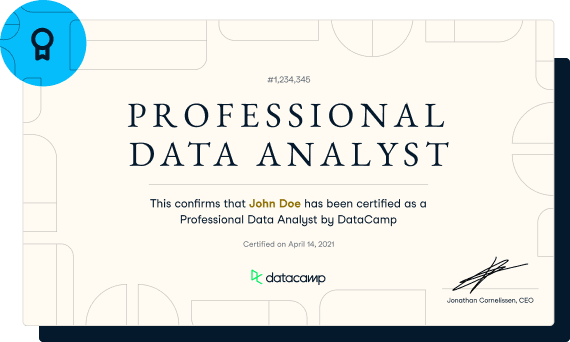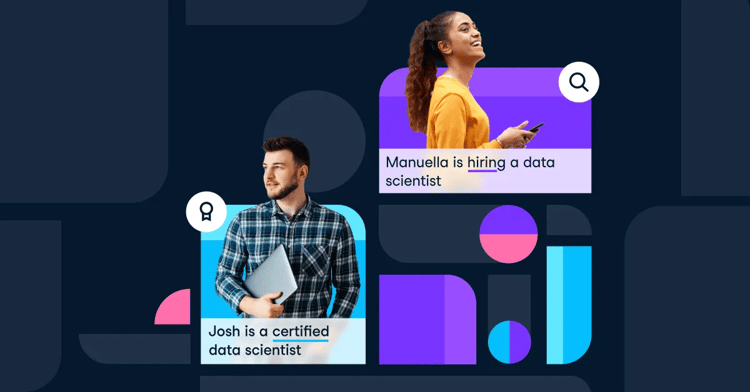Course
R programming has long been a vital tool in the data science landscape, known for its statistical strength and versatility in data analysis. This guide aims to navigate the R programming certifications available on DataCamp, designed for aspiring and current data professionals.
Choosing an R programming certification is a strategic step in enhancing your data science skills. DataCamp's certifications, tailored for different professional roles such as data scientists and data analysts, offer structured and comprehensive learning paths. This guide will provide a clear roadmap to help you identify the R certification that best aligns with your career goals and skill level. With a focus on practical application and industry relevance, these certifications are a gateway to advancing your expertise in the dynamic field of data science.
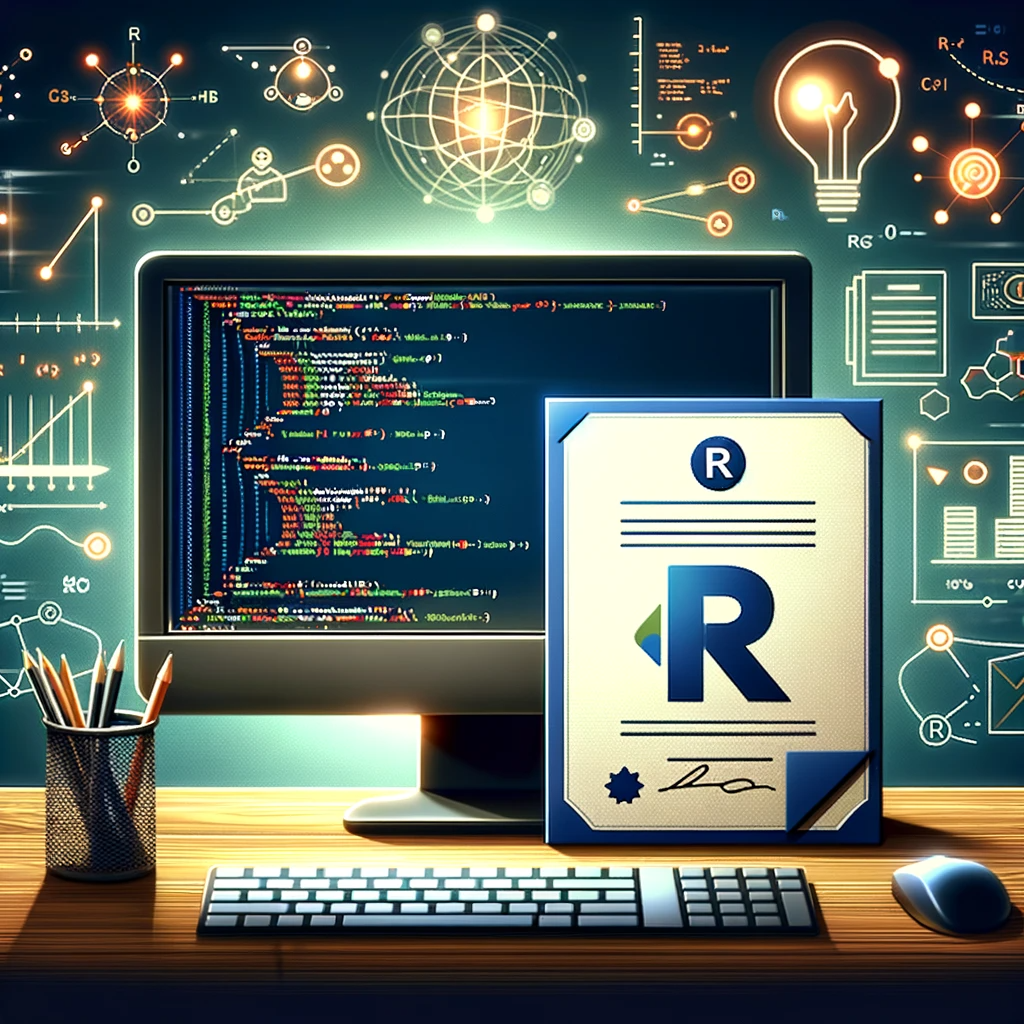
Created with DALL-E 3
Why Choose R Programming?
R programming is more than just a statistical tool; it's a fundamental language in the data science toolkit. Its importance stems from several key aspects:
- Statistical Analysis and Modeling: R is renowned for its extensive range of statistical analysis techniques and models, making it indispensable for complex data investigations.
- Data Visualization: With packages like ggplot2, R excels in creating high-quality, insightful visualizations, crucial for data interpretation and storytelling.
- Community and Support: The R community is vast and collaborative, offering a wealth of resources, packages, and support, which is invaluable for both beginners and experienced practitioners.
- Industry Adoption: R's adoption across various industries for data analysis and predictive modeling underlines its relevance and applicability in real-world scenarios.
- Versatility and Integration: R integrates seamlessly with other technologies and platforms, enhancing its utility in diverse data science projects.
Understanding these facets of R programming underscores its significance in the data science field. For professionals looking to solidify their expertise or for newcomers aiming to break into the industry, mastering R is a strategic move, opening doors to advanced data analysis, richer insights, and more impactful decision-making.
DataCamp's R Programming Certifications
DataCamp offers a choice of career-based certifications that focus on R programming, each tailored to fit different professional paths in data science. Understanding the specifics of each can help you make an informed decision about which certification aligns best with your career goals.
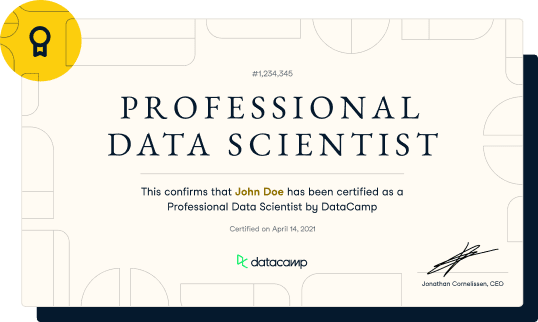
Data Scientist Certification
The Data Scientist with R certification is designed for those aiming to master the end-to-end process of data science projects using R. This certification covers data manipulation, visualization, and advanced statistical techniques. It is ideal for individuals looking to develop a comprehensive understanding of data science workflows and apply R programming to real-world data challenges.
This certification is recognized and valued by top employers in the field, addressing the significant demand for skilled data professionals, offering a comprehensive and rigorous test of your proficiency in various key areas of data science:
- Data Management: Handling and organizing large datasets efficiently.
- Data Science Programming: Demonstrating programming abilities in Python or R, along with SQL for various data science tasks.
- Statistical Experimentation: Applying statistical methods to derive meaningful insights.
- Exploratory Analysis: Investigating data to uncover patterns and relationships.
- Model Development: Building predictive models that can drive business decisions.
- Communication: Effectively conveying findings and analyses, a crucial skill for any data scientist.
Data Analyst Certification
For those interested in focusing on data analysis, the Data Analyst with R certification is an excellent choice. This program emphasizes the practical use of R for data exploration, manipulation, and visualization. It suits professionals who wish to extract meaningful insights from data and present them effectively, leveraging R’s powerful analytical capabilities.
The certification process is structured to validate your skills in several key areas of data analysis:
- Data Management: Mastery in handling and organizing data efficiently using SQL.
- Exploratory Analysis: Skills in investigating data to discover patterns and insights.
- Analytics Fundamentals: Understanding the basics of data analytics and applying them using Python or R.
- Data Communication: Ability to communicate findings clearly and effectively.
- Coding for Production: Demonstrating proficiency in coding within a production environment.
- Statistical Experimentation: Applying statistical methods to data for deeper analysis.
During the certification process, you'll be challenged with timed online tasks that test your ability to use Python, R, and SQL in practical data analysis scenarios.
Choosing the Right R Certification for You
Selecting the right certification from DataCamp's offerings hinges on your career aspirations, current skill level, and the specific areas of data science you are most passionate about. Here's a guide to help you make that crucial decision:
Assess your career goals
If your aim is to delve into the complete data science process, from data manipulation to advanced statistical analysis, the Data Scientist with R Certification is ideal.
For those more inclined towards extracting insights from data, performing in-depth analysis, and mastering the art of data storytelling, the Data Analyst Certification is a perfect fit.
Consider your current skill level
For both the Data Analyst and Data Scientist certifications, there are Associate and Professional levels. Associate levels are more targeted toward those at the beginning of their career, covering a more fundamental set of skills and knowledge. Professional levels, as the name suggests, are for more experienced practitioners with more thorough industry knowledge.
For associate exams, you will be automatically graded, giving you your results moments after submitting. At higher levels, you will be graded by a real human who will review the report and presentation that you submit.
Align with your passion for specific data science tools
If you have a strong inclination towards Python or R programming, the Data Scientist certification offers a deep dive into this language.
For a broader approach that includes SQL and possibly Python, the Data Analyst certification provides a comprehensive learning experience.
Your choice should reflect a balance between where your interests lie and where the industry is headed. Each certification has its unique strengths and caters to different aspects of the data science realm, ensuring that whatever your choice, it will equip you with relevant and in-demand skills.
Preparing for Your R Certification
Preparing effectively for your R certification on DataCamp involves mastering several aspects of R programming. You’ll also need to utilize a range of resources to deepen your understanding of R and data analysis. DataCamp provides various courses, tutorials, and cheat sheets that are essential for anyone preparing for their R certification. You can also find our top tips below:
Building a strong foundation
A solid understanding of R's basic syntax and core functionalities is the first step. This involves getting comfortable with data types, vectors, matrices, data frames, and essential packages like dplyr, ggplot2, and tidyr. These form the backbone of R programming and are critical for advanced learning. Our Data Scientist with R and Data Analyst with R skill tracks are the ideal resources to prepare for your R certification, offering comprehensive curriculums to improve your R skills.
Regular coding practice
The adage 'practice makes perfect' holds true for R programming. Engage in regular coding sessions, tackle small challenges, and participate in community projects. This consistent practice helps in internalizing concepts and improving problem-solving skills in R. We have a range of R project ideas that can help you get hands-on practice solving problems with R.
Real-world application
Applying R skills to real-world datasets allows you to encounter and solve actual data problems. Whether it’s through competitions or personal data projects, this experience is invaluable for understanding practical data manipulation and analysis and building a strong portfolio.
Debugging and problem-solving
Developing effective debugging skills is crucial. Learn to interpret error messages and troubleshoot your code. Online platforms like Stack Overflow can be invaluable resources for finding solutions to common coding issues. DataLab has a built-in AI assistant, which can help you learn more about your code and help with problem-solving.
Resources to Help With R Certification
If you want to get R-certified, there’s a high chance you’re going to need to learn or brush up on your skills. Below are some of the DataCamp resources that can help:
Courses
- R Programming Skill Track: Develop your R programming skills and learn how to code like a programmer in this beginner's track. Explore the R language and practice your R coding skills.
- Data Scientist with R Career Track: Learn how to use R for data science, from data manipulation to machine learning, and gain the career-building R skills you need to succeed as a data scientist.
- Data Analyst with R Career Track: In this track, you'll learn how to import, clean, manipulate, and visualize data in R—all integral skills for any aspiring data professional or researcher.
- Intermediate R Course: Intermediate R is the next stop on your journey in mastering the R programming language. In this R training, you will learn about conditional statements and more.
- Machine Learning Scientist with R Career Track: Unsupervised Learning in R. This course provides an intro to clustering and dimensionality reduction in R from a machine learning perspective.
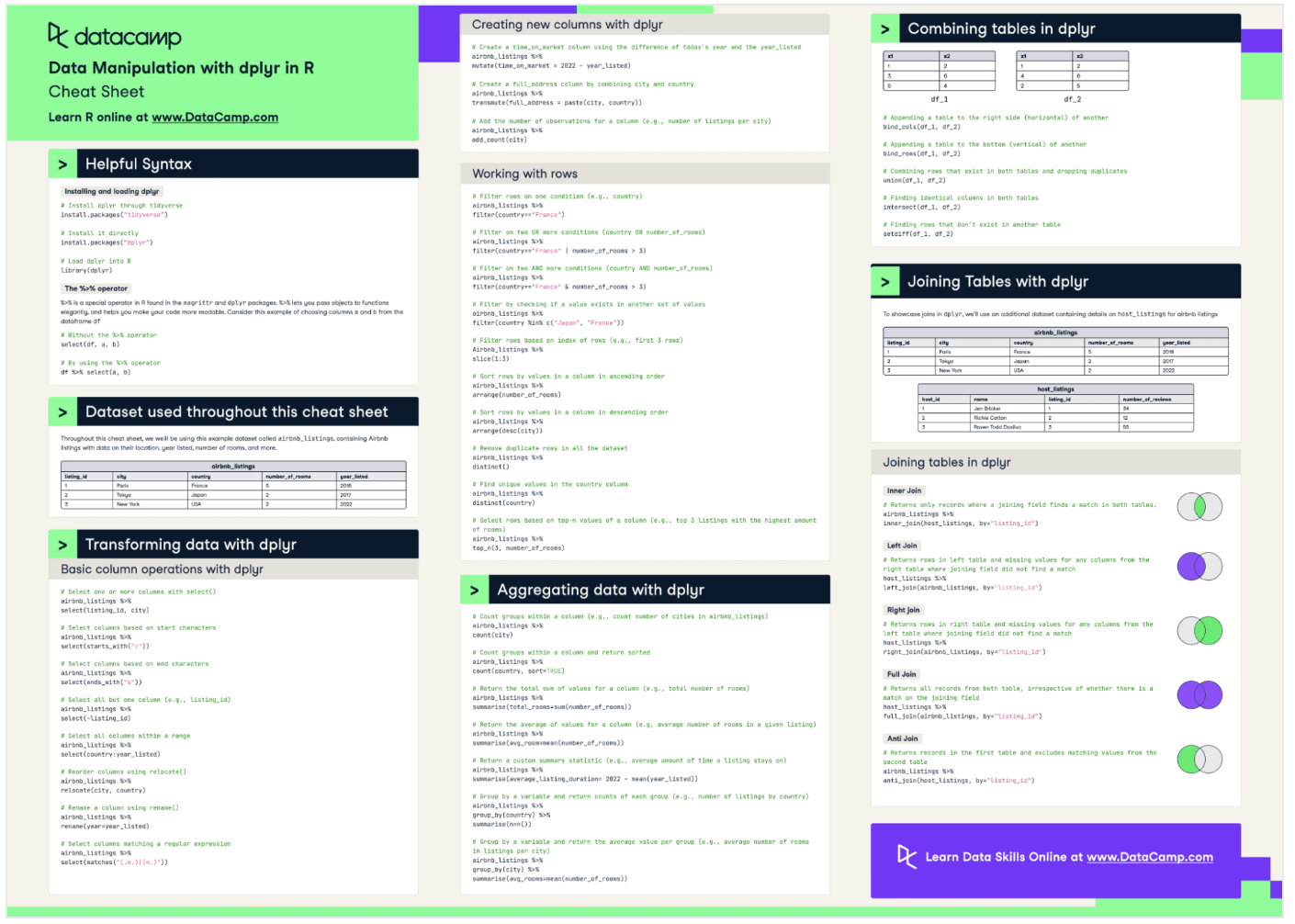
Get R Certified with our Data Manipulation with dplyr in R Cheat Sheet
Cheat sheets
- R Basics Cheat Sheet: A quick reference guide covering basic R functions like vector manipulation and mathematical operations, essential for foundational understanding.
- ggplot2 Cheat Sheet: This resource is invaluable for mastering data visualization in R, offering guidance on using ggplot2, one of the most robust data visualization packages.
- Data Manipulation with dplyr in R Cheat Sheet: dplyr is key for data manipulation in R, and this cheat sheet provides a handy reference for various dplyr functions.
- Descriptive Statistics Cheat Sheet: Learn about common statistical techniques used in descriptive analytics, a fundamental aspect of data analysis in R.
- Data Storytelling & Communication Cheat Sheet: Since communication is a vital aspect of data science, this cheat sheet guides you on best practices for crafting data stories.
Tutorials
- R Markdown Tutorial for Beginners: Learn what R Markdown is, what it's used for, how to install it, what capacities it provides for working with code, text, and plots.
- Introduction to Non-Linear Models and Insights Using R: Uncover the intricacies of non-linear models in comparison to linear models. Learn about their applications, limitations, and how to fit them using real-world data sets.
- K-Nearest Neighbors (KNN) Classification with R Tutorial: Delve into K-Nearest Neighbors (KNN) classification with R. Learn how to use 'class' and 'caret' R packages, tune hyperparameters, and evaluate model performance.
- T-tests in R Tutorial: Learn How to Conduct T-Tests: Determine if there is a significant difference between the means of the two groups using t.test() in R.
- A Guide to R Regular Expressions With Examples: Explore regular expressions in R, why they're important, the tools and functions to work with them, common regex patterns, and how to use them.
Final Thoughts
You now have a clear path to DataCamp's R certifications. Choose between the Data Scientist with R certification for a deep dive into data science, or the Data Analyst with R certification to focus on data analysis. Each offers a unique skill set, preparing you for a thriving career in data science. Start your journey now and elevate your R programming expertise to a professional level.
If you're preparing for an interview, try these 40 R Programming Interview Questions & Answers.
Get certified in your dream Data Scientist role
Our certification programs help you stand out and prove your skills are job-ready to potential employers.

A senior editor in the AI and edtech space. Committed to exploring data and AI trends.
FAQs
What are the benefits of obtaining an R certification?
An R certification validates your skills in R programming and data analysis, making you more attractive to employers. It also helps you stand out in a competitive job market and can potentially lead to higher salaries and advanced career opportunities.
What is the difference between an R certification and R courses?
R courses typically focus on teaching the skills and knowledge associated with R programming, while R certifications validate your proficiency in those skills through a formal assessment.
Should I pursue an R certification or a Python certification?
Choosing between an R certification and a Python certification depends on your career goals and the specific data tasks you expect to handle. R is particularly strong in statistics and graphical models, making it ideal for academic, scientific research, and industries heavily reliant on statistics. Python, on the other hand, is more versatile, widely used in machine learning, web development, and automation, which might be preferable if you're looking for a broader range of job opportunities.
Check out our guide on Python Certifications if you're considering this path.
Is there an official R certification?
There is no official R certification governed by a central R organization, as R is an open-source programming language developed by the R Foundation and the community.
Will learning R help me become a certified data analyst?
Yes, learning R can certainly help you become a certified data analyst. Our industry recognized Data Analyst Certification requires either R or Python proficiency, as well as SQL skills. Once you pass the exams, you officially receive your certification which opens doors to new opportunities in your career.
How long does it typically take to become proficient in R?
The time it takes to become proficient in R can vary, typically ranging from a few months to a year, depending on your prior programming experience and how much time you dedicate to learning and practicing.
What other certifications should I consider?
There are many certifications covering different technologies and career paths. Check out some of our other guides for an overview:
